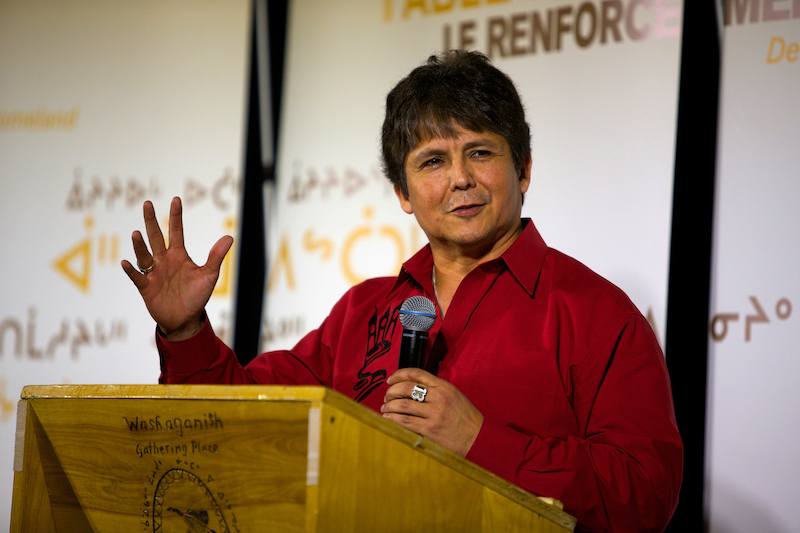Born into an impoverished First Nation in the Okanagan Valley of British Columbia, Chief Clarence Louie has become every bit a modern success story, serving as chief for nearly four decades and helping to propel his band to economic success.
First elected chief at the age of 24 in 1985, Louie helped turn the Osoyoos Indian Band into a success story, with high employment and millions in revenue for its 400 members. For his accomplishments, he’s been awarded the Order of Canada and was the first Indigenous person inducted into the Canadian Business Hall of Fame. He’s also sought out widely as a speaker, having travelled to Eeyou Istchee on various occasions to share his wisdom.
Now, in his self-described “last quarter” of life, Louie decided to impart some of the lessons he’s lived and learned into a memoir, Rez Rules: My Indictment of Canada’s and America’s Systemic Racism Against Indigenous Peoples. Looking back on his life, he offers a confrontational look at modern issues, including life on the rez, Native humour, systemic racism and residential schools.
Louie told the Nation that he’s been asked for over 20 years to write a book and decided “it’s now or never” to finally put one out. “I often quote from books because I think most successful people are educated people; a good part of their teachings come from books,” he said.

As an alumnus of First Nations University and the University of Lethbridge, Louie is passionate about education and encouraging Native people to read.
“In today’s society, leaders are readers,” he insisted. “The sad fact is that most Natives don’t read books, don’t have a personal library. I’ve been in a lot of households, it’s pretty rare I see a bookcase in Native homes, yet every person says they want their kids to go to school and go to college.”
If people don’t have a home library, Louie hopes they seed it by reading his book. “Read mine then start with a book a month,” he suggested. “Successful people are lifelong learners. Nobody is a know-it-all – that means you’re always a student.”
Louie acknowledges the importance of traditional education. “In the Native way, it starts at birth and never goes away. There are lessons to be learned in nature, in raising kids. My best teacher is my six-year-old granddaughter – she’s teaching me a lot of life lessons.”
One of the lessons he hopes people learn from his book is that reconciliation must “start with the land” and go beyond words and gestures. He sees most intonations of reconciliation as first steps: “They don’t improve quality of life for our people, don’t build a house on my rez or send my youth to college or help with costs that First Nations have to incur.”
Louie also sees a need for quality leaders.
“We have a lot of smartening up to do. We have to elect good leadership – problems start with leadership,” he explained. “I hope that First Nations people know that leadership isn’t about speeches… There’s too much phoniness in Native elections where we copy White people, even when we complain about White people.”
Economic independence, Louis insists, is a requirement for self-sufficiency and justice for First Nations. “Every society comes from an economic base,” he said. “When Hudson’s Bay came through, we had a system of trade before the French and English. They found an ancestral grave that’s 1,500 years old. What they found didn’t come from our territory, it came from other First Nations down south. It meant we had a system of trade with other First Nations.
“That’s what we have to get back to. Our people, every First Nation, self-supported themselves before the reserve system. We had our own system of trade and commerce and the ability to support ourselves.”
Louie acknowledges there are major barriers, mostly from the federal government imposing restrictions on First Nations. Nonetheless, he’s optimistic, pointing to Eeyou Istchee as a success story. “Many First Nations have proven they can make millions of dollars and make lots of jobs. The James Bay Cree do it, we do it. You really have two choices: you’re either independent or dependent.”
He hopes to gain readers in Eeyou Istchee, saying that he’s given speeches here on several occasions. “I know the James Bay Cree do some good economic development and have some good business operations going, which are an example for the rest of First Nations in the country to go to school on.”
The book is available at major stores and from online vendors. It’s also available as an audiobook, read by Chief Louie himself.





